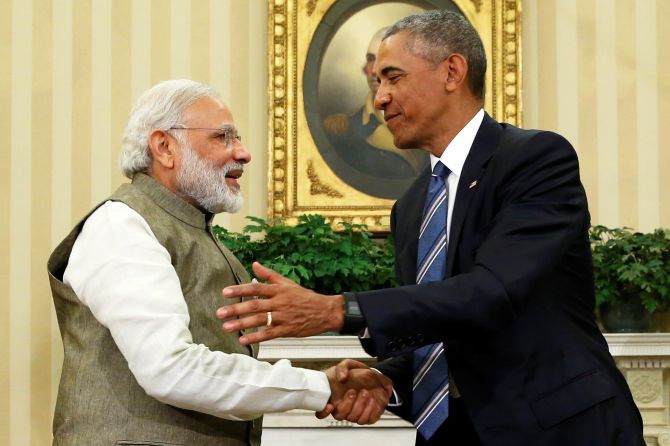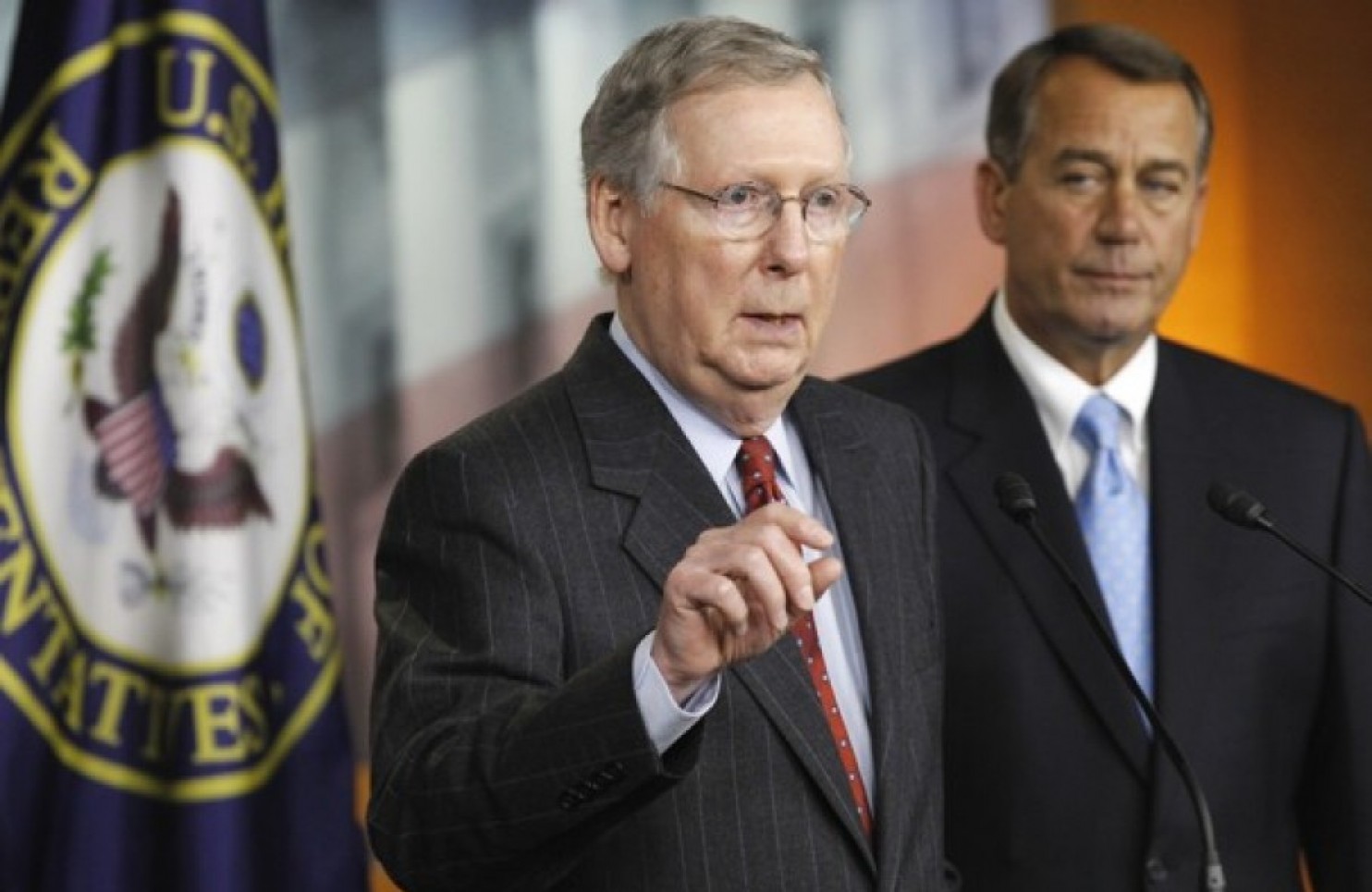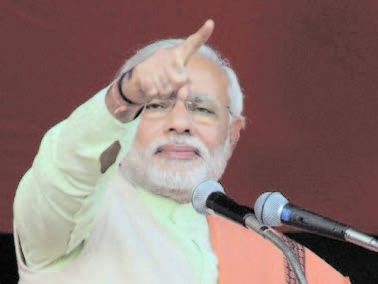
New Delhi: Support for India becoming a member of the exclusive Nuclear Suppliers Group, agreement on building six nuclear power plants in Andhra Pradesh, backing for India’s stand on terrorism vis-a-vis Pakistan and financial assistance for India’s clean energy initiatives are some of the key takeaways in an exhaustive India-US joint statement released in Washington on Tuesday.
The document, issued at the end of talks between US President Barack Obama and Prime Minister Narendra Modi, who is on his fourth visit to the US in less than two years, also lays out a road map for broad-ranging India-US collaboration in areas such as defence, trade and cyber security.
According to the statement, India and the US “pledged to pursue new opportunities to bolster economic growth and sustainable development, promote peace and security at home and around the world, strengthen inclusive, democratic governance and respect for universal human rights, and provide global leadership on issues of shared interest”.
Obama and Modi noted the “increasing convergence” in the strategic perspectives of India and the US and “emphasized the need to remain closely invested in each other’s security and prosperity”, the statement said.
On India’s entry into exclusive non-proliferation groups and regimes, the statement said India and the US “looked forward” to India’s imminent admission into the Missile Technology Control Regime.
“President Obama welcomed India’s application to join the Nuclear Suppliers Group (NSG)… The United States called on NSG participating governments to support India’s application when it comes up at the NSG plenary later this month,” it said.
In the area of nuclear power production, Obama and Modi welcomed the start of preparatory work for six reactors to be built by Westinghouse Electric Co. in Andhra Pradesh. India and the US Export-Import Bank are to work together on a financing package for the project, the statement said.
“Once completed, the project would be among the largest of its kind, fulfilling the promise of the US-India civil nuclear agreement and demonstrating a shared commitment to meet India’s growing energy needs while reducing reliance on fossil fuels… the two sides will work toward finalizing the contractual arrangements by June 2017,” the statement said.
Acknowledging India’s role in the accord agreed to at the Paris climate change talks in November, it said the US was committed to supporting India’s renewable energy programme and was working to spur greater investment in the area. Together, the two countries announced the creation of a $20 million US-India Clean Energy Finance (USICEF) initiative, equally supported by the US and India, which is expected to mobilize up to $400 million to provide clean and renewable electricity to up to 1 million households by 2020.
The statement also said that Modi and Obama “resolved that the United States and India should look to each other as priority partners in the Asia-Pacific and the Indian Ocean region”.
In maritime security, India and the US called for ensuring the freedom of navigation and overflight and exploitation of resources as per international law, including the United Nations Convention on the Law of the Sea, and settlement of territorial disputes by peaceful means. This oblique reference is aimed at China which is locked in maritime disputes with its smaller South East Asian neighbours in the South China Sea. China claims the entire South China Sea as its exclusive domain and has imposed flight restrictions and embargoed maritime routes through the disputed area.
In the area of defence cooperation, which “can be an anchor of stability”, the statement said the US “hereby recognizes India as a major defence partner”. The joint statement said India and the US would “explore agreements which would facilitate further expansion of bilateral defence cooperation in practical ways. In this regard, they welcomed the finalization of the text of the Logistics Exchange Memorandum of Agreement,” which would allow the two countries to provide logistics support, refuelling and berthing facilities for each other’s warships and aircraft.
The US will “continue to work toward facilitating technology sharing with India to a level commensurate with that of its closest allies and partners. The leaders reached an understanding under which India would receive licence-free access to a wide range of dual-use technologies in conjunction with steps that India has committed to take to advance its export control objectives,” the statement said.
In a boost for Modi’s Make in India programme, the US would support the Indian initiative to develop defence industries through the export of goods and technologies consistent with US law.
In the area of cyber security, Obama and Modi said they would deepen cooperation and were committed to enhancing cyber collaboration on critical infrastructure, cyber crime, and malicious cyber activity by state and non-state actors.
On terrorism, Obama and Modi condemned “the recent terrorist incidents from Paris to Pathankot, from Brussels to Kabul” and “resolved to redouble their efforts, bilaterally and with other like-minded countries, to bring to justice the perpetrators of terrorism anywhere in the world and the infrastructure that supports them”.
The two countries pledged to work together to combat terrorist threats from extremist groups such as Al Qaida, Da’esh/ISIL (Islamic State), the Pakistan based Jaish-e Mohammad and Lashkar-e-Taiba, besides Indian gangster Dawood Ibrahim and his group and their affiliates “including through deepened collaboration on UN terrorist designations”.
The two countries have finalised an arrangement to facilitate the sharing of terrorist-screening information and “called for Pakistan to bring the perpetrators of the 2008 Mumbai and 2016 Pathankot terrorist attacks to justice”, the statement said.
To boost trade, India and the US resolved to “break down barriers to the movement of goods and services, and support deeper integration into global supply chains, thereby creating jobs and generating prosperity in both economies”, the statement said.
The two leaders agreed to facilitate the freer movement of people of both countries. The US also welcomed India’s interest in joining the Asia Pacific Economic Cooperation forum.





Be the first to comment